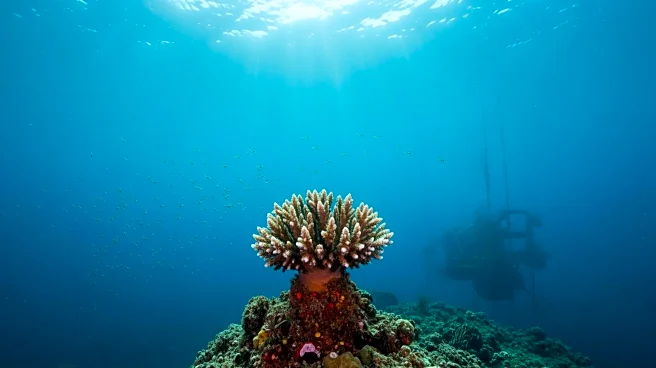What's Happening?
At the COP30 conference in Brazil, Canadian activist Paul Watson, known for his longstanding opposition to whaling, has pledged to intensify his efforts against deep-sea mining and Norway's krill industries.
Watson, who has evaded arrest in Japan for over a decade, is focusing on marine protection, emphasizing the critical role of oceans in combating climate change. He highlighted the importance of phytoplankton, which produce a significant portion of the oxygen humans breathe, and warned of the risks posed by climate change to these organisms. Watson, a former influential member of Greenpeace and founder of Sea Shepherd, has been a prominent figure in marine conservation, known for his direct actions against whaling and trawling ships. He plans to confront Norway's krill fishery practices, which he claims threaten the food supply of whales and penguins, and opposes the mining of rare earth minerals on the ocean floor, a practice he believes could devastate marine ecosystems.
Why It's Important?
Watson's actions at COP30 underscore the growing concern over the impact of human activities on marine ecosystems. The extraction of krill and deep-sea mining are contentious issues, as they pose significant threats to biodiversity and the health of oceanic environments. Krill are a vital part of the marine food chain, and their depletion could have cascading effects on species that rely on them, including whales and penguins. Additionally, deep-sea mining for rare earth minerals is controversial due to its potential to destroy habitats and disrupt ecological balance. Watson's advocacy brings attention to these issues, potentially influencing international policy and conservation efforts. His focus on marine protection highlights the need for comprehensive strategies to address climate change, which affects both terrestrial and marine environments.
What's Next?
Watson plans to challenge Norway's krill fishery practices when the High Seas Treaty takes effect in January. This treaty could provide a framework for regulating activities in international waters, potentially curbing practices that harm marine life. Watson's efforts may lead to increased scrutiny of krill harvesting and deep-sea mining, prompting discussions among policymakers and environmental groups. The international community may face pressure to implement stricter regulations to protect marine ecosystems. Watson's continued activism could inspire other environmental advocates to join the cause, potentially leading to broader coalitions aimed at preserving ocean health.
Beyond the Headlines
Watson's activism raises ethical questions about the balance between economic interests and environmental conservation. The exploitation of marine resources for commercial gain often conflicts with the need to preserve biodiversity and ecological integrity. Watson's focus on smaller marine creatures, such as krill, highlights the interconnectedness of ecosystems and the importance of protecting all levels of the food chain. His actions may prompt a reevaluation of how societies value and manage natural resources, encouraging a shift towards more sustainable practices. The legal and diplomatic challenges Watson faces also illustrate the complexities of international environmental advocacy, where activists must navigate differing national interests and legal frameworks.









